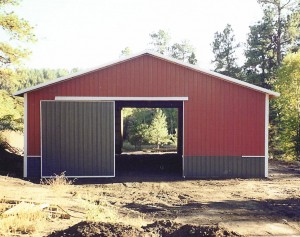We had a recent inquiry from a client who needed a new pole building for farm equipment storage. He has a windrower and several balers and trailers to put in the building. His initial request was for a 30’ x 40’ building, with a single sloping roof and a 14 foot eave height. For doors he wanted four 20 foot wide by 14 foot tall sliding doors.
 Other than the requested eave height not being adequate (sliding doors DO need something to mount to), two 20 foot wide doors could have been mounted on each of the 40 foot long walls. I say ‘could’ because this would most likely not work out to be the most practical of design solutions. 20 foot width sliding doors are truly big doors and in this configuration, only one door on a wall could be opened at a time.
Other than the requested eave height not being adequate (sliding doors DO need something to mount to), two 20 foot wide doors could have been mounted on each of the 40 foot long walls. I say ‘could’ because this would most likely not work out to be the most practical of design solutions. 20 foot width sliding doors are truly big doors and in this configuration, only one door on a wall could be opened at a time.
Hansen Pole Buildings’ Designer Doug was able to show the client the benefits (as well as tremendous cost savings) of a gabled roof, as opposed to the single sloping roof. The client determined his door needs could be met with one sliding door each, on the same sidewall, of 16 foot and 18 foot widths. These would still need to bi-pass each other on double tracks.
At this juncture, the client asked, “I am going to need some additional information about the sliding doors. Specifically I need to see how they are going to work, and what kind of track/rollers they will have. Can you send me something detailing this?”
Doug sent to the client the chapters from the Hansen Pole Buildings’ Construction Manual
https://www.hansenpolebuildings.com/blog/2011/07/how-often-and-why-building-technical-support/
which pertained to the components and assembly instructions for sliding doors.
The reply, “I appreciate your response and the door hardware details. This cleared up a few questions.
I still do not see how the sliding doors are going to work in relationship to the building itself. I will need to have the post layouts specified on the quote, so that I understand where the posts are in relationship with the doors. I do not want to get a building I cannot use for my purposes. Typically posts are set at 10 foot centers, but since my doors will be most of the side wall, I just do not see how this is going to be accomplished without posts in the middle of my openings. I also do not see how with 36 foot of opening capability, on a 40 foot building where the doors are going to go when open. Any support you could lend in clearing up this important detail will be greatly appreciated.”
Now a brand new issue has been raised – the client was anticipating somehow having an opening of up to 36 feet in width on one 40’ sidewall…..and just now realized the doors had nowhere to slide to!
With sliding doors, they do need a ‘place to park’ so it was back to the drawing board with some other options. By turning the roofline 90 degrees, the sliding doors could be located in the peaked endwall – where a roof truss can carry the load without the need for large structural headers.
For bi-parting doors – they “park” either over the other door location (in front of the other doors), or often one over the other on an adjacent wall. Again, the determinant is available wall space
The best door opening choices are to place a 20 foot wide split (bi-parting) door in the center of the end. This would be the most economical as well as most secure solution – providing the client can work with a 20 foot wide opening.
The other choice, is to mount double tracks on the endwall, and provide a 26 foot wide hole. Doors would be a seven foot wide door on the inside track, then two six foot wide doors on the outer track, and one more seven foot door. One six foot and one seven foot door would slide in each direction.
We will see where this saga leads.






